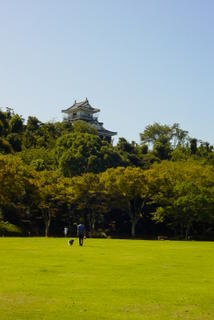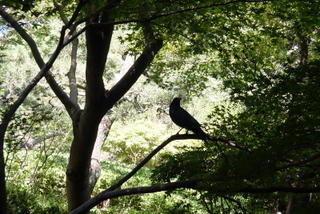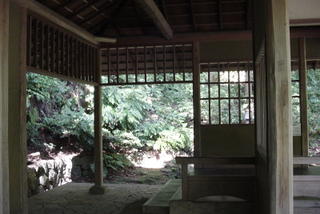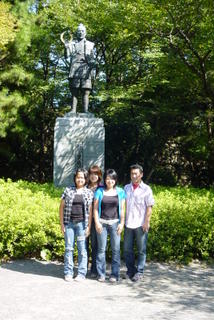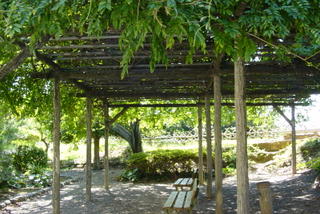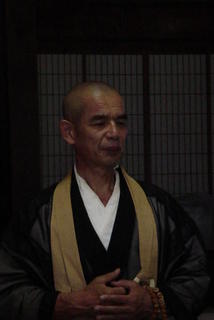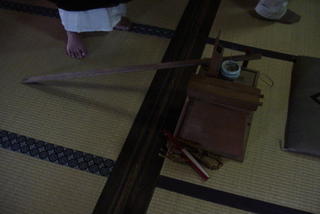30 September 2005
"Teaching" in Japan: From Tennis to Drinking Parties
I was already a little nervous because the whole school was watching my every move. That morning, two people had seen me with a tennis racket. An hour later, the entire teachers’ room knew I was going to play tennis that afternoon. Now as I sat waiting for the girls to rescue me, every student stared at me in my un-professional sports gear. I knew I stuck out like a sore thumb (which I often forget in this country) but I still felt unworthy of all the positive attention I got all the time. One group of girls stopped just to stare at my legs. “You’re so white!” one of them said. “It’s so beautiful!” Those are two phrases I’d never hear together in the States. I was huddled in a ball, because the wind was rather chilly, but I felt like I had hung myself up for display. Where were the tennis girls?
Finally the girls found me and took me to the courts. They politely struggled with their English while I struggled with my Japanese. Imitation was the best action in this case. I followed them and copied what I saw…and soon we were warming up at the net. I was a little stiff and out of practice, but I felt myself slipping back into something I loved in high school: practicing with your teammates. No competition, no killer instincts, just the simple joy of working together to hit the ball. I felt the endorphins kick in and I was really happy. At one point the guys’ soccer team ran past, and a boy called out, “Lauren, I love you!!” I was so surprised by this that I immediately burst into laughter. In fact I was so shocked to even hear the phrase “I love you” in Japan that I couldn’t quit laughing. I don’t know why, but the personal expression used in such an impersonal situation was so foreign, but so close to home at the same time. It was strange.
All the girls were very sweet and patient and I hit with quite a few of them, rotating out so as not to disrupt their usual routine too much. We practiced for about 2 hours and I think my ability level was pretty much on par with theirs. I wasn’t necessarily making anyone a better player, but I definitely wasn’t bringing them down, either. There are no lights on the courts so we stopped when it got dark. I followed suit as we gathered in a circle. There was some incomprehensible Japanese and then we all said “thank you” and bowed in unison. More incomprehensible Japanese and my name stood out in the middle. The coach can’t speak much English so the students translated, “We enjoyed playing with you and are looking forward to next time. Monday at 4 o’clock.” Whoa! Did I just join the tennis team? But still it made me happy, and I smiled. The exercise was fun and good for me. I decided I would talk to the coach later, when I had a better translator, and see if I could join the team every Monday and Thursday. On other days I had tea ceremony club and English club…and on Fridays, I am just plain ready to go home.
The next day was field trip day (yay!) and since I’m a full-time teacher, I got to go for free (YAY!). I rode the bus with my supervisor and her 9th-grade homeroom class to Hakone. We went to a large lake with a beautiful view of Mt. Fuji, and I was psyched because this was what I wanted to see in Japan – lakes and mountains. The most beautiful places on earth, tied with Japanese gardens.
The ride up the mountain was smooth and warm, so it was hard not to fall asleep. When all 8 buses of 400 students got to the lake, we swarmed through the tourist shop and eventually landed on a large boat for a scenic ride. I think I had my picture taken with every student on board. I was so pissed that I had forgotten my camera. The weather was beautiful and there were many red Shinto shrines at the water’s edge. Mt. Fuji stood majestically with clouds gathered at its base – making it look absolutely huge. Eventually the boat reached the “hiking” trail, which was a wide, paved path through the woods. The hills were pretty decent but it was cool under the trees, and we reached the destination about 40 minutes later. My back was sore from playing tennis so the walk felt good.
Then the teachers gathered in the soba shop for a quiet lunch while the students ate bento boxes outside. The soba shop smelled of –what else—soba, and something else strange and unidentifiable. The atmosphere was beautiful, incredibly Japanese and minimalist, with large circular windows that made me feel like I was in a piece of artwork. The round windows were slightly unsettling. I was either in a Japanese DaVinci painting, or below deck on a large ship.
I ordered cold soba with mushrooms and pasted yams. The mushrooms were strange and the yam paste had no apparent flavor but a really weird texture. I didn’t like it at all, but I tried to suck down the noodles anyway. (I do like soba.) A teacher asked me if I was okay, and my “Mmm-hmm!” reply sounded so tight and high-pitched that they all knew I was lying. They laughed, and I continued to slurp the soba. When someone produced huge purple grapes I was grateful for the familiar food. But the grapes turned out to be unlike grapes I had tasted before. The skin was very dark purple, almost bitter, and it dried out your mouth the same way a red wine might. Tannins, I guess? Underneath the leathery skin, the grapes smelled and tasted like ripe flowers. They were the biggest and most delicious grapes I’d ever eaten.
On the bus ride back down the mountain, my supervisor and I fell asleep. When I woke up at the high school, I was groggy and felt the beginning of a sinus headache. The teachers were supposed to party at a sushi place that night, but I didn’t want to go. The awkwardness at lunch seemed like enough cultural stimulation for one day. I tried to assess how bad I felt, and whether or not I could really get out of going…but I knew I couldn’t. I was tired, dirty from hiking, and I wanted to be alone, but I went to the party anyway.
When I arrived at the small, hole-in-the-wall sushi place, I was surprised to find one of the cleanest and most beautiful Japanese dining rooms I’ve seen yet. The dining space was one room on the 2nd floor, with one large table. (The kitchen was an even smaller room on the 1st floor. So we teachers were the only customers.) I put my things against the wall and waited to be told where to sit (I read somewhere that sitting first is extremely rude, and that there is always a seat of honor that should be declined many times before you actually accept it…) Anyway, I was surprised because this time there was no seat of honor. The table was set with numbered chopsticks, and each teacher drew a straw to determine his place was at the table. As a left-hander I was happy to be at the end of the table, but I was surrounded by teachers who couldn’t speak English. Great. Not much talking for Lauren tonight, I thought. That was fine by me, because I was tired. I looked around the room, admiring the beautiful flower arrangements and scrolls on the walls, and then I studied the strange appetizer at my place. Unidentifiable raw fish, something that looked like crab salad, grilled tuna, little fish with eyeballs and all parts still included, whole raw shrimp, a giant slug/snail thing still left in its shell (to be extracted with a toothpick), and the one “safe” dish: a tiny saucer of soy sauce.
When everybody got to the table, the waitress loaded us with bottles of Asahi beer and everyone poured drinks for everyone else (you never pour your own drink; it’s rude. Instead, you wait for someone to fill your glass. Then you turn around and refill theirs. So everybody has a full glass of alcohol for pretty much the entire meal, because everyone is pouring and pouring when they’re not pulling raw slug-things out of shells.)
After a toast the meal began rather quietly, and I was surprised by how tame the drinking party seemed. At first I didn’t like the food, and it made me uncomfortable. The crab salad was okay, and the tuna was good, but I didn’t touch the snail thing. The whole fish with eyeballs were soaked in a tasty sauce, so I ate those, but I was still eating whole fish with eyeballs, and it made me a little queasy. I was also nervous because I was chasing everything I ate with the beer, to wash down weird tastes, which meant my glass was continuously refilled…and I knew my alcohol tolerance was extremely low, because I was hungry. Next they brought us dishes of sushi. I grabbed something I thought was salmon, which I like, but the flesh was held together by membranes that I had to chew and chew and chew. Then I saw some raw white fish. Good, I thought. Plain white fish – this is safe. But I quickly realized that what I had eagerly popped into my mouth was not fish, but squid. Again, I chewed and chewed and chewed. I wanted to spit it out but I had nothing to spit it into. And besides that, everyone would see me doing it. I chewed some more. My saliva turned the rubbery squid into a nauseatingly mealy piece of flesh. I chewed some more. A teacher asked me a question and I answered him with squid in my mouth. Still chewing. Finally, unable to take it any longer, I moved the squid to the back of my mouth and swallowed it whole. I quickly threw back the rest of my beer, to get a different taste in my mouth. Someone refilled my glass.
The beginning of the night was rough. But surprisingly, each course got better and better. By the end of the night I decided the meal was absolutely delicious, one of the best I’ve had in Japan. I had daikon, salmon eggs, cooked lobster, grilled white fish stuffed with egg, raw tuna rolls, cucumber rolls, cooked spinach, some of the most delicious, tender meat I’ve ever eaten in my life, and one more really interesting dish: the waitress lit small fires at each of our places, then placed little teapots on top of the fires. I asked someone if it was tea and they all laughed. “English teacher!” they yelled. “English teacher, come explain this to Lauren!” An English teacher, who I like very much, came over and explained that it was like a soup, “made with a very, very expensive mushroom. We Japanese love this mushroom fragrance, so it is very expensive.” As if to say, “You’re lucky to get a taste of this.” He showed me how to pour the soup into a little saucer and drink it straight from the dish. “Then, when you finish the soup,” he said, “you open up the teapot and eat the mushrooms.” I poured the light yellow, oily soup and waited a bit for it too cool. When I drew the saucer to my lips all eyes turned to me in anticipation. Oh man, I hope it’s good, I thought, not wanting to disappoint anyone.
It was delicious. “Mmm!” I said, almost involuntarily. Then the silence turned to laughter and talking, and they were happy I was enjoying myself. When I drank all the soup I opened teapot but found more than mushrooms: some pieces of chicken, some shrimp, and some spinach – all delicious. There was also a small egg that came from some kind of bird, but not a hen. I skipped the egg and moved on to something else delicious.
I was also surprised by how much I enjoyed the time with the teachers. We all got louder and louder as the evening went on. Everyone was laughing. I realized I knew more Japanese than I thought, and they made huge efforts to speak more English. They were absolutely thrilled I liked the food, and they laughed when I refused to eat the snail. Every now and then a teacher would come sit at my end of the table just to talk with me and watch me eat. They were stunned to learn that I like sake more than beer, and they were shocked that I like cold sake. I don’t know what the big deal was but they were so excited that they stopped the beer orders so we could all drink sake. It tasted delicious, especially with the food. The teachers’ kindness continues to amaze me. To give you an idea, at one point someone looked directly at me and rattled off Japanese. I looked to an English teacher for help. The first guy repeated himself, and then the English teacher said, “Ahh, yes, you are very popular. Everybody here likes you.” I blushed and muttered something I can’t remember. Then later (this one tops the cake) another teacher said, “Oh, you are a strong drinker!” What! Okay, now we know they’re lying. J
At one point, a man began to hum an old American tune and he was thrilled when I joined him. He didn’t know the words, so when I started singing the whole table got quiet to listen to me. “Old Susanna, now don’t you cry for me…for I come from Alabama with a banjo on my knee…” Who knows where they heard this song, but they were really excited I knew it. Then, a teacher said my name sounded like the Rawhide song. Remember, Japanese often confuse Ls and Rs. So when he said “Lauren,” it came out sounding like “Rollin’.” And he started singing, “Rollin’ rollin’ rollin,’ keep them doggies rollin’, rawhide!” I cracked up.
The whole dinner lasted about two hours, which was perfect for me. It ended on a good note, before anyone got too tired or too drunk, and everyone was happy. I felt so satisfied and I was so glad I went. I scolded myself for trying to get out of the party. This comeraderie and socializing with coworkers was a duty, and part of my job description – almost as important as teaching classes. I reminded myself that I was lucky and quite privileged to be a part of it all—shame on me for wanting to avoid it!
I never felt such a level of acceptance, or like I was part of a group, when I was in France. I don’t feel Japanese, but I never expected to feel Japanese. I am a foreigner, but I am still overwhelmed by the generosity and kindness of these people. If you show an appreciation for their world, they are willing to take you in. And that makes me really lucky.
29 September 2005
Tempura: Food for Thought
Hattori Sensei kindly picked me up at the train station and took me to her beautiful, spotless home. It was probably the cleanest house I've ever visited. When I first arrived, I chatted with her husband, who also speaks very good English (again, lucky for me!). He seemed thrilled to discover my last name, because Salisbury was a British prime minister who helped Japan and Russia sign a peace treaty in the early 1900s. So I had an unfair advantage, but I felt instantly liked and comfortable in this couple's home.
Hattori Sensei gave the cooking lessons while her husband made conversation. He is quite the history buff, and also has a thing for country music. At the dinner table he broke out into songs by Johnny Cash and LeAnn Rhimes (spelling?) which delighted me but didn't seem to please his wife too much. Johnny Cash reminded me of friends from school, and even though an older Japanese man was singing, an invisible connection formed between my close friends in America and this new "friend" in Japan. It made me happy. I want to make Mr. Hattori a James Taylor CD since I'm from NC.
When he stopped singing, to his wife's visible relief, the three of us discussed more serious topics: differences in Japanese and American culture, how the Japanese language is changing, tea ceremony, and how all of these things are affected by the media and advertising. It was a very intellectual conversation, but the Hattoris were so warm and genuinely interested in my thoughts that I felt comfortable voicing my opinions. They asked me what I studied in college, and when I told them "International Studies and Globalization," I decided to open a can of worms that had been squirming for quite some time. I'll try to summarize without going into too much detail.
You'd think that when you study something, you'd understand it. And when you understand something, you can grow to like it. But after 4 years of studying globalization, I still don't understand it completely, and I am not convinced it's a good or positive thing (however much a moral judgment can be made -- and I think one can). Hattori Sensei was troubled by Japan's changing advertising, because Katakana English is often used when there is "already a perfectly good Japanese expression." She saw the loss of Kanji as a sad erosion of her culture, which she is working hard to maintain. Her husband, on the other hand, stated simply that all languages change, and that it was no big deal. My feelings rest somewhere between these two ideas. And when they asked me why I came to Japan, I tried telling them something I hadn't discussed with anyone before.
I came to Japan to learn about Japanese culture, whatever "traditional" culture is, before it becomes more "eroded" by Western ideals and globalization. "Eroded" definitely has a negative connotation, but just hear me out. In truth, I think many aspects of globalization are bad. But I can't logically explain why that is -- just a gut feeling that I don't like. (The cheap explanation is that if the whole world thinks alike, it will become boring for me.) Yet, my presence in Japan contributes to the very changes of globalization that seem bad. So that would make me a hypocrite, and selfish, for coming to Japan in the first place. But I chose to come anyway, bringing all my Western ideas with me to learn about Japanese culture. In the meantime, I think Japan is changing and doesn't quite know where it's going, because different generations don't agree on what it means to be Japanese.
So I feel confused about being in Japan, how it's affecting me, but more importantly, how it's affecting those around me. I'm not saying that as an individual I have the power to change everyone around me. But little by little, more things from the outside become acceptable. Do I contribute to the Katakana English at the 7/11? I'm teaching English, for crying out loud! But is that for Japan's benefit, or America's? What about how I (voluntarily) make coffee for the teachers every day, instead of tea? Sure, it's just a drink, but that snowballs into purchases, and advertising, and what appeals to whom, and what language is used to advertise what, and who ends up reading and buying everything...and that leads to other products people want to buy, and more advertising...do you get the picture?
In short, I'm not sure if I'm doing the right thing or not. And I told them this. And what made me feel so...happy...was that they seemed to understand. The Hattoris got very quiet but there was such a feeling of acceptance in the room. I knew I had shared my thoughts with the right people, and I was grateful to have such an appropriate outlet. For better or for worse, I made a connection, and I was just happy that they understood, instead of telling me, "Lauren, you think too much."
28 September 2005
June Bug Joke
Last night, in an unexpected twist of events, Jun Sensei and John joined me for dinner. Jun, Mayumi and I are the youngest teachers at my high school (all in our twenties) and although Jun can't speak much English, the 3 of us joke around in between classes and lesson-planning. At the beginning of the year, before I knew Jun's name, a dead June Bug ended up on my desk after cleaning time. Suspecting a student placed it there as a "gift," and wanting someone to laugh about it with me, I tapped Jun on the shoulder and pointed at the insect. "June Bug," I said, and smiled. Looking confused and serious, Jun promptly disposed of the dead bug by dropping him outside the window, handling the matter like a mature father looking after his young. It was only afterwards, when Mayumi told me his name was Jun, that I realized why he was so confused when I said "June Bug" over and over. That day we called him "June Bug" and the name has stuck ever since. Jun has an odd sense of humor and is always cracking jokes in Japanese (that Mayumi has to translate for me), but often they're so off-the-wall that even Mayumi doesn't understand them. So usually, Jun will rattle something off, and Mayumi will look at me and shrug, "June Bug joke." And then the two of us crack up.
Anyway -- last night, Jun came over for dinner. I made Japanese curry and salad, and it turned out to be the best I've cooked so far. Also, thanks to Mom's decorating help, my apartment now looks fabulous. While I wasn't initially thrilled about having guests, it turned out to be a fun evening. Somehow we laughed a lot even though I know Jun and I have a lot of trouble communicating. I was impressed he would attempt a dinner with two foreigners who can't speak Japanese. Yay for June Bug.
Dancing with Mom
The main thing is that Mom was here recently and left for home today. She stayed about a week and overall we had a blast. We went to Ito for the dance festival, like I mentioned before, and it was crazy. All these foreigners (Americans, British, Chinese, Russian, Irish, etc.) crammed into a tiny rental shop somewhere near downtown Ito (which has a pretty coastline and quite a scenic train ride. It strikes me as a cross between the Mediterranean and Costa Rica. It's really weird to think that I look out to the ocean and I'm staring in the direction of California). Anyway, I was led up a steep set of stairs to a tiny room crammed full of kimonos, wide-eyed foreign women, and Japanese ladies yelling and grabbing and tying and wrapping and bending over and hanging up and pinning and re-pinning...the usual, standard scene when 5 Japanese women are trying to dress 20 foreigners in 6 layers of kimonos in a space that is about 15 ft X 5 ft. I hooked on my starched, white toe socks (for thong sandals), and then was told to take of my clothes, which were promptly lost under the carpet of kimono layers that were tossed on the floor. For reasons unclear to me, I was dressed and re-dressed 3 times by 3 different ladies. But all I had to do was stand there in front of a mirror while the rental shop ladies did the work. If this was just a kimono, I wondered what the wedding gear was like.
While I was being dressed, I asked Mom to locate my clothes. By now she was looking great in a green kimono that had the same flower design as my red one. We then realized that bending over in a kimono is a nearly impossible task, because they are tied so tightly and so much fabric is looped, wrapped, and stuffed around your waist. Mom managed to snag my clothes with her toe. (Rescued!) Meanwhile the ladies were pinning my hair with kitchen rubber bands. As far as using the bathroom, well, suffice it to say that no one went.
Downstairs the Chinese girls were doing a much better job of dancing than the Americans. An old Japanese man in a kimono hummed a tune while we awkwardly tried to pick up the steps. After an eternity, and me realizing I couldn't even sit down in my kimono (much less bend over), we were handed shoes and walked through town to the "starting line" of the parade. Luckily an older Japanese lady was in line in front of me, so I had a skilled dancer to demonstrate the moves. Once the parade started I was able to pick it up pretty quickly. It was a rather short routine that repeated over and over. We had about 3 water breaks total and I think we danced / paraded for about 1.5 miles. I've never had so many action shots snapped by strangers in my life. I was exhausted by the end of the night, so the fancy outdoor onsen was a welcome respite after being shrink-wrapped in thick silk. After a hot bath I collapsed into bed. What a cool experience.
But the relaxation didn't last long. Mom and I had to leave our lovely hotel for the speech contest in Numazu, an inconvenient 1.5 hours away on a private train line (oops!). However! That also turned out to be fun, because I saw other ALTs, and most importantly my student won 2nd place! So she will continue to the state / prefectural rounds, and I will continue coaching her after school. The next contest is on October 15.
Unfortunately, with all the commotion I didn't have a chance to take photos. But Mom did, so if she emails me pics I will post them.
19 September 2005
If You Read No Other Posts, READ THIS ONE!
The opportunity to visit a Buddhist temple was very unexpected, but something I have wanted for a long time. So I gladly joined other ALTs and the friendly monk at his beautiful home.
The temple entrance was absolutely breathtaking. If you can't tell from my photos, I'm obsessed with Japanese gardens. Sunlight glowing through lacey leaves is one of the most beautiful sights on earth, and gardens are full of them. Usually I'm not one for fantasy (I didn't like "Lord of the Rings" and "The Never-Ending Story" gave me the creeps), but something about Japanese gardens feels so fantastic, magical, and other-worldly that entering them is like stepping into heaven. Adding to the fantasy effect, the garden was chock-full of dragonflies gracefully zooming back and forth. They were so large, and there were so many of them, it felt like you were under water surrounded by fish. There must have been 40 dragonflies in the air at any given time, and they looked like fairies. So before I even entered the temple, I felt far removed from my everyday reality. How you can be in that environment and not feel something...incredible and worthy of enormous respect, I will never know.
So we slowly entered the temple and were ushered to a tatami room. We were given small, sweet "cakes" made out of a chalky substance, and green tea. "To help with zazen," the monk told us in Japanese, which was quickly translated by a nice host father. Now I'm no expert in Buddhism, Zen, or zazen, so please keep that in mind for the remainder of the post. My understanding is that Zen Buddhists practice zazen: sitting on cushions in a lotus-style position and meditating. Your head faces forward, eyes stare at a spot on the floor about one meter in front of you. So your eyes are half-closed, but you remain alert. Your hands are folded in a certain way and placed down in your lap. Focus on breathing. Other than breathing deeply, you don't move. At all. Monks do this for hours at a time, and this monk told us that during his training, he would sit in zazen for at least 3 hours a day. One week of every month, he would do nothing all day but sit in zazen. He paused only to eat and use the bathroom. But he was not allowed to sleep.
The Westerners, however, in our too-tight jeans and t-shirts, sat in awkward zazen poses for 20 minutes. The monk burned a stick of incense to mark the time. Also to begin zazen, he smacked two wooden blocks together, and rang a bell four times. To end zazen, he smacked the blocks once and rang the bell once more. It was like transporting you to another world and then calling you back into this one. I thought my biggest concerns were maintaining the position, clearing my head, and staying alert enough not to slouch or sleep. I was eager to begin.
But then the terrifying part came. If you look down in the "Temple" photos, you will see a picture of a small altar, the the monk's feet, and a long, flat stick. Once we were seated in zazen and our ankles were beginning to ache, the monk explained the purpose of the stick. In short, it was used to keep us alert. If we slouched, or fell asleep, or moved AT ALL, he would hit us on the back. However, if we were sitting especially well, he would also hit us, for encouragement. The monk placed two cushions in the middle of our circle to demonstrate the amount of force he would use to hit us. It was the same either way -- if we did poorly or if we did well, we got hit with the same amount of force. Now, I cannot begin to describe to you how hard he hit the pillows. It was not a smack, bump, hit, or even a whack -- none of these words accurately convey how hard and fast the stick came down. He used his whole body and the whip came from his shoulders and back muscles. And the stick moved so quickly that it made a high-pitched whistle as it cut through the air. I am not exaggerating. Many girls gasped when they saw his demonstration. Cheerfully, he told us not to worry, that he would go easier on the girls. As soon as we sighed with relief, he said, "I'm only kidding. Distinctions are wrong, so if I distinguish between male and female, I will go to hell. So, I will also hit girls like this." The cushions jumped as he gave them two more whips. Then he encouraged us to request the stick, because it would "clear our heads," and he showed us how to bow to make our request clear. (You were to place your hands together in front of your heart, and bow low while sitting so that he could hit your back. Four times. The right and left sides of your spine, then again -- right and left. He would walk around the circle as we meditated, and hit someone when he deemed appropriate, or when we asked for it.
I was so confused and began to panic in my silence. Was there a mis-translation? Was he joking about hitting girls so hard? Hitting any of us that hard? How would we know if we had done a good or poor job? What if I sneezed? What if a dime-sized mosquito landed on my cheek? What if I didn't want to be hit? The American girl beside me, my friend Courtney, whined to herself, "What is going on? We don't hit people like this in my culture." I didn't agree with her attitude, but I was terrified all the same. I have never felt so far away from home in my life. What had I gotten myself in to? I was in another country, practicing something from another religion, under the complete control of a bald man who could go for a week without sleeping and didn't speak my language. Now I understood how girls went to other countries and got tangled in situations that looked so stupid and easily preventable from the outside. I understood how curiosity killed the cat.
When the monk clacked the blocks, my body went rigid. Nobody moved. I forced myself to breathe slowly and there was no way I was going to fall asleep. My entire body was focused on where the monk was in the cirlce, and how long he paused each time he stood in front of me. I had to swallow every time he passed because I was so nervous that he might hit me. And then I worried that such a big swallow would be considered "moving." The adrenaline gave me a headache and the incense burned my eyes. Was I allowed to blink? I tried blinking only when the monk was facing the other direction.
When the monk turned and bowed to someone down the line, I heard a girl gasp. Out of the corner of my eye, I could see him gently place his hands on someone's back, to guide him/her closer to the ground. First he gave two light taps, I assume to inform the ALT of where exactly he would be hit. And then the monk whipped the person's back four times, with all the force he exerted earlier on the pillows. He had not been joking. After, the gently guided the person back to sitting position, and the "teacher" and "student" bowed to each other slowly. I didn't dare move, so I had no idea if the person had asked to be hit, or who the person was.
The monk continued to circle. After about 10 minutes I could feel myself slumping, but I was afraid to straighten my back and catch the monk's eye. So I prayed the slump was only perceptible to me. How could this be good meditation? I wasn't focused on clearing my head. I was only focused on the monk's movement, my own breathing, and my pointless will to not endure pain. I had a very brief taste of what torture might be like -- having no control over anything, seeing others around you being hurt and not being able to do anything about it for fear that the same thing would happen to you. A person would most definitely go insane feeling like that for too long. I decided that if the monk stopped to hit me, I would look up at him and back away. Quickly. I wouldn't allow it to happen --and too bad if it wrecked everyone else's zazen.
Over the course of 20 minutes, the monk hit about 5 or 6 people. He did not hit me. It turns out only one person who got hit did not ask for it. Right before time was up, the girl beside me (who complained earlier) asked to be hit. I couldn't believe it. I was in awe and total disbelief. Why did she feel she needed that experience? It was nothing I had a desire to try -- I just wanted to meditate, in peace, for goodness sake. When the stick came down on my friend's back, I heard her skin and the organs under it flaten out under the pressure.
Shortly after that, the monk ended the zazen, and I felt like I was alive again. I was rejoicing. I looked around me, but nobody else looked how I felt. I turned to John with huge eyes but he looked totally calm. He had a lazy smile on his face. "Why weren't you terrified?" I asked him. I was almost, but not quite, angry he seemed to take it so lightly. He just shrugged. "I don't know. If you get hit, you get hit. I couldn't really do anything about it. Of course it would hurt like hell, but nothing lasts forever."
The experience made me realize a lot of things. I was shocked into silence for the rest of the day, and had a hard time being genki with my host family because I couldn't stop thinking about the temple. I'd never been so out of control in my life, and I was frustrated to finally realize how much control I need to feel comfortable. I was also frustrated because no one else seemed as afraid as I did. They were just like, "Yeah, it was hard, and now I have four red welts down my back, but I had to try it, you know?" What were these people talking about?! It made me feel crazy, like I was the only one who wanted to avoid it. Why was I a control freak because I didn't want a stranger to beat me with a big wooden stick? A few hours later, I spoke to John again about how strange and nervous I felt. He smiled and said, almost sarcastically, "Was it everything you hoped and dreamed it would be?" (He knew I had wanted to visit a temple for a while.) I glared at him, speechless. Why did I feel like no one on the planet understood me when it came to religion or spirituality? I felt like I was always on a different religious plane. Most of the time I couldn't even articulate my thoughts to myself, so how could someone else understand me well enough to have a real conversation about it? I felt miles away from John and everyone else, and like I had more in common with the dragonflies outside. At least they wouldn't whip me or piss me off, and joke about it afterwards.
The thing that surprised me even more was how good I felt after zazen. My head DID feel clear. To make a really bad analogy, if my brain were a toilet, it was like someone dumped in tons of adrenaline and then flushed. My head, my whole body really, felt totally empty and clear. If it were a toilet bowl it would have been white and gleaming. I was seeing things for what they were. And I was so glad to be alive and healthy.
At this point, I'm not sure where to go with this story. It's not over for me, as I'm still thinking about the possible consequences of the situation...what it says about me, what it says about the rest of the world, etc. I just know that this was an unexpected landmark for me, and usually my landmarks are premeditated. I have this idea that I draw my own maps, and mark my own spots. But really they are drawn by some other hand, and I'm just along for the ride.
Osuka
Okay. First there were pictures. Now there are words They say a picture is worth a thousand words, but I don't always know if that's an even trade.
At the community reception hall in Osuka, we had traditional Japanese food in the tatami room. Most of it was familiar but I did try one new thing -- a cup filled with warm, liquified red beans and mochi. Mochi is a rice cake, which is basically a smooth, gooey-chewy blob of rice substance. It's not little pieces, like a ball of rice; instead it's all one texture that is clear-white and somewhat starchy. Sometimes mochi is so chewy it's hard to break apart and you end up swallowing big chunks. I don't care for this kind. But if the mochi is sweetened, it's usually a little more refined (easier to chew) and then I like it. If unsweetened, downing one is a significant task. Anyway, my host mom brought me a warm cup of reddish-brown pulpy liquid, and I thought it was a drink. Turns out it was purified, sweetened red beans with mochi hidden inside. It was pretty good but I didn't ask for seconds.
After lunch we were treated to a private drum performance. We watched older ladies twirl and stomp battons, and the rhythm (spelling?) was soothing. The beat combined with a full stomach made me sleepy, so I was surprised when they told us to learn the routine in 15 minutes and then perform for the city newspaper. None of the ALTs really believed we had to get up on stage and do it...and we groaned about sitting in traditional Japanese style (you can see in the photos, by the time we performed, my knees were killing me and I had to sit to the side). But actually, it turned out to be tons of fun and everybody was laughing when the battons weren't flying into people's heads. It was definitely a work-out -- I must say I had more respect for the ladies afterwards!
Welcome to Osuka

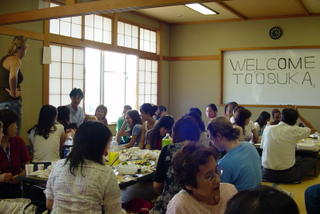
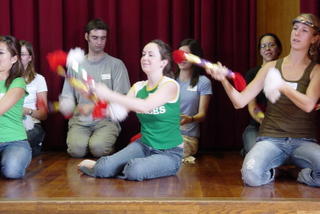
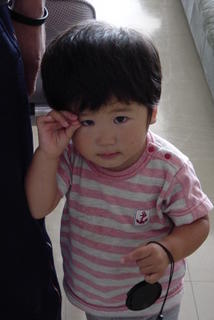
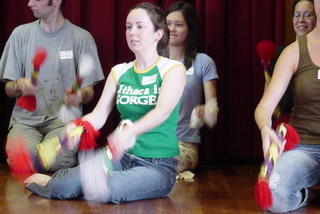
The past weekend was the most challenging I've spent in Japan so far. I went with other ALTs to Osuka, where we stayed with host families. We learned a traditional drum performance, and then went to a Buddhist temple where we sat in zazen. It was probably the most terrifying 20 minutes of my life -- at least, nothing immediately comes to mind that has scared me more. The next day, my host family took me to see a castle, Japanese garden, and kite festival museum in Hamamatsu.
I'll post photos now, because I took quite a few, but I will elaborate when I have more time. The pictures should be interesting but I think what I have to say will be just as valuable. Hope you enjoy.
14 September 2005
Engrish
" ROSANZERUSU."
(answer is below!)
After class I was looking at the website www.engrish.com . This chronicles many Japanese-English mistakes, and they made me laugh so hard that 3 Japanese people came over to see what was so hilarious. Immediately I was embarrassed, but I tried to explain some of the jokes, and by the end I had them laughing. Most of the errors are hard to explain, because they turn out to be rude or vulgar in English. Take a look at the website; it's hilarious.
Despite all these funny mistakes, I encourage students to try and not worry about messing up. In one class the Japanese teacher was talking to the students to reinforce the idea. Eventually he promised everyone, "Yes, mistakes are wonderful!"
In one sense, yes...but I doubt that will carry over on test day.
(What the student meant to write was, "Los Angeles.")
13 September 2005
Explosion
(Last night I had some friends over for dinner and we stayed up late talking, so I'm tired. Hence the bullet-style blog.)
Today will be my first day with the tea ceremony club after school. I'm REALLY excited and looking forward to learning something peaceful. Maybe I can use my yukata now (a yukata is like a summer kimono).
Thursday night John and I will go to Mayumi's house for dinner! She'll teach us how to make gyoza so I'm really looking forward to it. Mayumi is my friend and fellow teacher, who lives in our apartment complex, and hanging out with her is always fun.
Saturday I'm going to another town to see a children's festival that has been celebrated for hundreds of years. I'm going with other ALTs and we'll stay with different families who live in the small town, so that should be an interesting cultural experience to say the least.
Monday is a holiday and the school librarian invited me to her house for dinner. This is a big deal and I am really looking forward to it. She'll teach me how to make tempura and I think how to roll/prepare sushi as well. Very exciting.
Then Mom arrives Tuesday and I'm taking her to the traditional neighborhood restaurant. The owner loves John and me by now and her face lights up when she sees us. We love her food and her sake.
Thursday Mom and I are having dinner with my supervisor at a nice Italian restaurant. I'm interested in seeing what Japanese Italian food is like!!
Friday is another holiday, and Mom and I are joining other ALTs in Ito for a dance festival. We'll get fitted for kimonos, learn a traditional Japanese dance, and then participate in another festival that "celebrates the happiness of the people."
We'll spend the night in Ito, then hop on a train the next day to Numazu (beach town), but for academic reasons: one of my students is in a speech contest! (An English speech contest, of course.) I'm helping her practice after school, and on Saturday we'll watch and support her in the actual competition.
Then at some point Mom leaves. :(
September 30th my school is going on a hike, and that night the teachers will go out for a party (enkai!). A much-anticipated event so hopefully I'll have good stories.
And at some point after that, I think Mike is coming! :) And the weekend after that, I'm going to Kyoto!!
The point of regurgitating my calendar is to let you know why there may not be any posts for a while...I hope you all are doing well. EMAIL ME and tell me what's going on in Amerika!
12 September 2005
Top Secret
One from a girl: "I think [insert teacher's name here] is very cute! Please don't tell anyone!" This made me laugh because I think the teacher is cute, too, and I also didn't want anyone to know.
Another from a guy (this one tops the cake): I like to play basketball and spend time with my friends. We talk about a lot of things, including girls. We mainly talk about girls. This is okay because we are healthy males. But don't tell anyone because it's top secret!!
Of course, with 330 students, I will have little trouble concealing their identities. :) I have a feeling they're voicing the majority's opinions...
11 September 2005
Today
In other news, a gorgeous stray kitten was found near the school. Not only is this slender, dark grey-striped kitten beautiful, but he is friendly, and will lie on his back purring for as long as you wish to pet him. He doesn't bite or scratch or play all the time like most frisky kittys, yet he has a healthy amount of energy. Basically, this is the perfect kitten. Last week the school nurse took him home and I was insanely jealous but also relieved that someone could care for him. Today, the kitten is back under a box outside the school, because the nurse's husband didn't want him. This breaks my heart. I tried asking about a pound, so that a good owner can buy him. But the half-Japanese / half-English response I got sounded like there are no kitty pounds, just kitty impounds. So if no one takes him, he will be killed. This absolutely breaks my heart. If I owned a square foot of grass I would scoop him up and worry about the consequences later. But I live in a school-owned apartment, and I don't think I can afford vet bills. Please, someone, take this cat!!
The "French" bakery across from the school, Boulangerie Printemps, has an interesting assortment of French-Japanese pastries. I tried a few but was discouraged when I twice ended up with seafood curry donuts. They tasted good, but I was expecting something sweet. I can't read anything in the store, except "chocolate," so I basically stopped going. Today, however, they're having a rare sale, so every teacher in the school went to load up on pastries for a dollar a piece. (My tiny supervisor bought ten!!) So many teachers were excited that I decided to go, too. I armed myself against curry donuts by learning the word for sweet in Japanese...and I ended up with something delicious. It looks like a fresh, puffy cream pastry with powdered sugar sprinkled on top...but instead of being filled with real cream, it is filled with soybean cream! (Essentially, very soft, slightly-sweetened tofu.) Not only was it not horrible for you, it tasted delicious and was not too sweet. I'm going back next month when they have another sale.
I may have mentioned this before, but I am so glad I like my supervisor. She strikes me as relatively laid-back and understanding, and somehow we just "click." It's funny but I think much of this is due to the fact that we have the same eating patterns: we both like to eat little bits all day long, and we're usually hungry. A shared taste for Japanese-French donuts doesn't hurt, either. I left school at 5pm and saw her coming out of the bakery -- she bought more pastries! So we're able to laugh about mundane things, like eating, and the teachers who always yell at the students, and the teachers who always offer us food and strange "anti-adiposis" tea from China.
Ishii Sensei (my supervisor) often makes me laugh. She has a one-year old daughter, and even though she is not "naturally maternal," it's obvious she tries to be a good mother. This morning I sat down at my desk and asked if she had a good weekend. She smiled, sort of, and said, "Yes, but I was with my daugher," (she paused to let those implications sink in) "for 48 hours." Her view of motherhood makes me laugh. Of course since I don't have kids, I don't know what I'm talking about, but she performs many tasks of motherhood with a reluctance that sparks my sympathy. "I get so tired, with no time to myself, but my daughter must get very lonely during the week -- so on the weekends I spend time with her." I think I can understand how she might feel, spending too much time with people. I spend too much time with the other Americans around Fuji. Granted, they're all potty-trained by this point, but I could use more time to myself as well. More time for me and some new Japanese friendships that hold a lot of promise.
09 September 2005
Atami


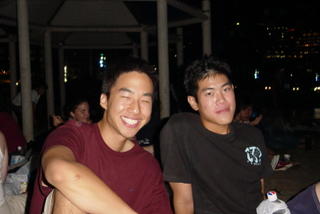
First, please let me apologize for the decreasing quality of these posts...now that I've started teaching, I have less time to write, so I'm forced to slop down my thoughts. Some of you are probably happy I am writing less. :)
Second, I wanted to share more photos. These were taken in Atami, a town known for its Japanese baths and tiny little beach...but most of all, for its fireworks display. A few Sundays ago they shot off the most spectacular fireworks I've ever seen, flashes that would have cost thousands of dollars in the States. Flames were shot from boats positioned in the ocean, and they exploded right above our heads, which rested on the sandy beach. The fireworks formed all kinds of shapes, from hearts to 5-pointed stars to balls, and right before the finale, they shot fireworks I'd never seen before -- somehow, it looked like the entire sky was raining golden light and fire into the sea. Absolutely gorgeous. I took videos with my camera, but I'm having trouble posting them...so alas there are no firework pics, but here are some people!
Top: view just before dusk
Middle: Natasha and others who braved the water
Bottom: Jeff and Brad goofing off after dinner
07 September 2005
The Teacher - Student Relationship
I think most Americans have this idea that Japanese schools are very rigid and strict, and that students study all the time. So it should go without saying that Americans think Japanese teachers are likewise strict and formal. This is what I thought before I came. Of course, only part of this is true. Because of the group mentality (for lack of a better phrase) in Japan, a lot of emphasis is placed on mutual dependence and representation. If anything is strict, it's to keep things cohesive, and so everyone involved with Fuji Higashi will give a good impression of the school. All teachers, students, and principals have a responsibility to be role models for everyone else. So everyone works together and everything flows, without too many ripples in the water. If you cause a stir, you stand out. (Standing out is evidently so undesirable in Japan that a student won't tell me he didn't get a worksheet -- even though I ask, "Does everyone have a worksheet? Please raise your hand if you need a paper." Two minutes later I notice that two or three pairs have formed in the rows, heads bent toward one piece of paper that students are trying to share.) Just as everyone represents Fuji Higashi, almost everyone follows the same rules. Because students are not allowed to perm their hair, dye it, or wear jewelry, teachers are strongly encouraged to refrain as well.
In the classroom, teachers command a lot of respect by changing the tone of their voices - they become louder, deeper, and at times, almost aggressive. Students know when to perk up. And as for studying all the time, students spend the better part of their day in the classroom, and participate in club activities after school. Most kids don't go home until 6pm. Then they have homework.
All these things sound familiar to an American, right? This is how we think Japanese school works.
However! Many things are different, and I have trouble finding the line between teacher and...friend...and parent...and mentor...and advisor...and comedian. When children enter school, the parents get a break because most of the "rearing" is left to the teacher. If a kid gets suspended for smoking, the homeroom teacher will visit him every day. Supposedly, if a student is arrested, he will not call his parents, but his homeroom teacher. The teacher will pick him up from jail and scold him as necessary, like a parent. In a Japanese classroom, the teacher seems like more of an authority figure than in America. They spend most of the time at the front or the room, on an elevated step to command attention. But! Students are allowed to sleep! Teachers don't reprimand students for sleeping, or get upset with them when they do. Because group activity is encouraged, many times students will discuss an answer before an individual will offer one. An American student would never do this; instead, I think he would struggle to find the answer, often for a long time, and either guess or finally admit that he doesn't know. The teacher will then help this individual, in front of the whole class, until the answer is reached. If a Japanese student can't answer the question, more often than not he (or she) will sit there. If they're really embarrassed, they blush and look at their desks. So as a teacher, you wait a few moments, and if no response comes, you move on to the next student, trying to do as little damage (read: embarrassment) as possible. And that American know-it-all who always raises her hand? The girl who wants all the attention because she always has an answer? That student doesn't exist in Japan. Even if someone knows the answer, 100%, she will not raise her hand.
In between classes, students are allowed to freely enter the teachers' room. They line up to ask teachers questions, and joke around with other teachers while they wait. In America, at least in my schools, students never went into the teachers' lounge. That was like encroaching on their territory, their private space, their time when they didn't have to play "THE TEACHER." But here, instructors are happy to visit with students, make each other laugh, and relax more than in the classroom. Also, during club activities, teachers participate with students as much as they instruct them.
Probably the most unusual thing about Japanese school is cleaning time. There are no janitors. Instead, students clean the school, including getting rid of all the trash in the teachers' room. If teachers aren't busy and are nice, then they help.
So in short, I'm learning to play many roles that some American teachers wouldn't necessarily play. I'm learning to teach, but also how to teach in Japan. However, I doubt that my job is any more difficult than it would be in America...
05 September 2005
Now I Know
- teaching
- teaching and making it interesting
- speaking English s-l-o-w-l-y
- avoiding the Oreo sale at the grocery store
- looking presentable / professional during a typhoon
- doing laundry when the machine is outside on the balcony, and there's a typhoon, and you're out of clean professional clothes
Some things are easier than I thought:
- waking up on your own every day, 5 minutes before your 6am alarm (I prefer a graceful awakening to the early sun over the invasive bleep of an alarm clock, even if it is before 6 o'clock)
- exercising before work
- getting tired at 2pm
- drinking coffee...mmmm, coffee
- cooking
And on another note: Maybe because the language barrier makes me feel helpless (a lot of trouble for Japanese people close to me), I am super grateful for every little, unnecessary gesture. Today a young woman who works in the school office showed me three ways to write my name in Chinese characters. But she said that one way in particular was very beautiful, and that my name was very beautiful, because it's the characters for "cherry blossom" and "love" put together. Haha. So trivial, but what a nice thing to say when she doesn't have to talk to me at all.
01 September 2005
Differences
"I think he tells you that because he knows that in the West, people are very punctual about going home. He thinks it must be strange for you to stay past 4pm." The image of Americans hanging out at the office after 5pm is too funny and too bizarre. It would never happen.
But still, I'm in Japan, so I decided to stay.
Opening Ceremonies
And all the while I am sitting at my desk, repeating my short speech in Japanese over and over, hoping I won't forget anything when I introduce myself in front of the whole school (we have about 1,000 students).
The gym is under construction so the ceremonies were held outside in the heat. I felt bad for students, sitting in perfect rows on the ground, facing directly into the sun. All the girls had the same posture, with knees bent and feet out in front of them, arms wrapped around their shins. "I shouldn't be nervous because they can't see me anyway," I told myself. Everybody was squinting into the sun. At least my face was shaded and I had put on sunscreen. Some teachers stood with towels on their heads in an attempt to stay cool.
At some point I heard the principal say "Amerika" and I knew it was my turn to speak. I climbed up the metal stairs to the microphone. I was nervous and the students were sweating out their boredom. I pretended to be relaxed, hoping my real feelings would catch up with the mask. I leaned into the microphone and exlclaimed, "Atsui! (It's hot!). All the students laughed and that was enough for me to feel better. I made it through my speech, forgot the verb for "teach," recovered in a few minutes and finished okay. Evidently my speaking was up to speed, because for the rest of the day everyone approached me in Japanese. "I didn't know you could speak Japanese!" they all said excitedly. It was encouraging but also very frustrating. Learning a language requires a lot of patience, and I want to be fluent now. I can't speak Japanese - I had just memorized a few lines well enough to say them smoothly. But I was amazed and very humbled by how nice and encouraging everyone was. I'm very grateful to all these teachers for their kindess, so I hope I can repay them by doing a good job.
Today the students are taking an exam, all day long, so things are a bit quieter. I am exhausted from the excitement of yesterday. This morning I made a word search about me, made 330 copies, and now I'm putting the finishing touches on my first lesson plan.


